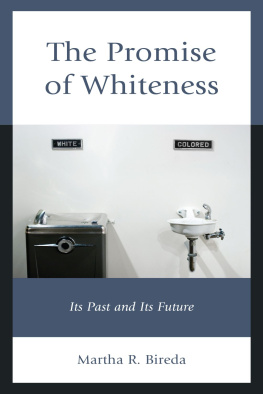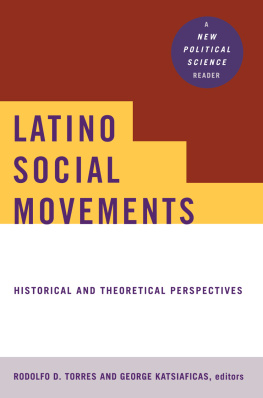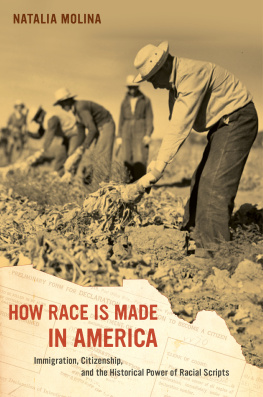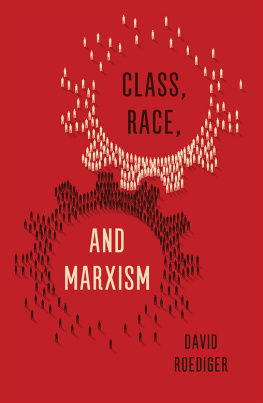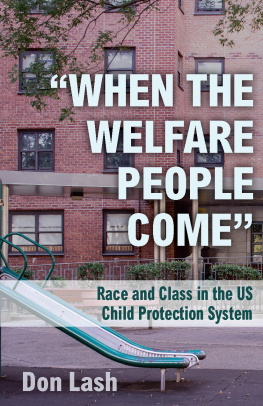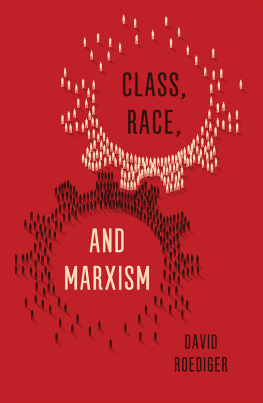Torres Rodolfo D. - Race defaced: paradigms of pessimism, politics of possibility
Here you can read online Torres Rodolfo D. - Race defaced: paradigms of pessimism, politics of possibility full text of the book (entire story) in english for free. Download pdf and epub, get meaning, cover and reviews about this ebook. City: Great Britain;Großbritannien;United States;USA, year: 2012, publisher: Stanford University Press, genre: Politics. Description of the work, (preface) as well as reviews are available. Best literature library LitArk.com created for fans of good reading and offers a wide selection of genres:
Romance novel
Science fiction
Adventure
Detective
Science
History
Home and family
Prose
Art
Politics
Computer
Non-fiction
Religion
Business
Children
Humor
Choose a favorite category and find really read worthwhile books. Enjoy immersion in the world of imagination, feel the emotions of the characters or learn something new for yourself, make an fascinating discovery.

- Book:Race defaced: paradigms of pessimism, politics of possibility
- Author:
- Publisher:Stanford University Press
- Genre:
- Year:2012
- City:Great Britain;Großbritannien;United States;USA
- Rating:3 / 5
- Favourites:Add to favourites
- Your mark:
- 60
- 1
- 2
- 3
- 4
- 5
Race defaced: paradigms of pessimism, politics of possibility: summary, description and annotation
We offer to read an annotation, description, summary or preface (depends on what the author of the book "Race defaced: paradigms of pessimism, politics of possibility" wrote himself). If you haven't found the necessary information about the book — write in the comments, we will try to find it.
Race defaced: paradigms of pessimism, politics of possibility — read online for free the complete book (whole text) full work
Below is the text of the book, divided by pages. System saving the place of the last page read, allows you to conveniently read the book "Race defaced: paradigms of pessimism, politics of possibility" online for free, without having to search again every time where you left off. Put a bookmark, and you can go to the page where you finished reading at any time.
Font size:
Interval:
Bookmark:
R ACE DEFACED
Paradigms of Pessimism, Politics of Possibility
Christopher Kyriakides and Rodolfo D. Torres
Stanford University Press
Stanford, California
Stanford University Press
Stanford, California
2012 by the Board of Trustees of the Leland Stanford Junior University. All rights reserved.
No part of this book may be reproduced or transmitted in any form or by any means, electronic or mechanical, including photocopying and recording, or in any information storage or retrieval system without the prior written permission of Stanford University Press.
Printed in the United States of America on acid-free, archival-quality paper
Library of Congress Cataloging-in-Publication Data
Kyriakides, Christopher, author.
Race defaced : paradigms of pessimism, politics of possibility / Christopher
Kyriakides and Rodolfo D. Torres.
pages cm
Includes bibliographical references and index.
ISBN 978-0-8047-6334-9 (cloth : alk. paper)ISBN 978-0-8047-6335-6 (pbk. : alk. paper)ISBN 978-0-8047-8315-6 (e-book)
1. United StatesRace relationsPolitical aspectsHistory. 2. Great BritainRace relationsPolitical aspectsHistory. 3. RacismUnited StatesHistory. 4. RacismGreat BritainHistory. 5. Anti-racismUnited StatesHistory. 6. Anti-racismGreat BritainHistory. 7. CapitalismSocial aspectsUnited StatesHistory. 8. CapitalismSocial aspectsGreat BritainHistory. I. Torres, Rodolfo D., 1949author. II. Title.
E184.A1K97 2012
305.800973dc23
2012009551
Typeset by Newgen in 10.5/15 Adobe Garamond
CONTENTS
PR EFACE
We, the authors, met in the summer of 2006 while attending a Marxism and Racism workshop at the University of Glasgow. One of us (CK) was just completing a two-year research fellowship with the Departments of Sociology at Glasgow and Bristol, an England-Scotland comparative study of the relationship between racism, nationalism, and Muslim inclusion/exclusion. The fellowship had followed from doctoral work at Glasgow on the antiracist state. The other (RDT) was at Glasgow as an Adam Smith Foundation visiting fellow with the Department of Sociology and had just published Savage State and After Race. Despite having lived our lives on different continentsCK born and raised in Glasgow and RDT in East Los Angeleswe connected intellectually and on the basis of our shared antiracist activism and internationalist perspective.
Theory-wise we were both tired of irresolvable debates around race versus class, not that we didnt hold strong and strident positions. Rather, there was a sense in which moving forward had become almost impossible both theoretically and politically. We were both equally exasperated with post-Marxism, postmodernism, and the cultural turn, in that although each ism brought insight, we felt stuck in a critical impasse, a present without release. This was the negative that connected us. The positive was our mutual respect for Left radical theory. At the time we were reading Ernst Bloch and Cornelius Castoriadiswriters who were in many ways on the fringe. We admired Frantz Fanon and C. R. L. Jamesactivists who each possessed a keen critical sense, tapping into the pulse of the moment in order to offer ways in and out of the present. It was a sense of possibility that attracted us to their canon. It is easy to criticize but much more difficult to offer a future sense, and we wanted this possibility to infuse our collaboration. We were both drawn to comparative method and empirically saw commonalities between the treatment of Muslims and Arabs in the United Kingdom and the United States, but more cryptically, the recent War on Terror, its effect on Arab migrants in Europe, and the browning of America drew our attention to how each could offer insight into the other. We agreed that it was important to situate this treatment historically from a class perspective but not the sterile positivist class of social science. It was essential that we reintroduce the subjective in class analysis as drawn out by scholars such as Georg Lukcs, Franz Jakubowski, and E. P. Thompson and that we imagine the racist and antiracist state theoretically within the subjective relations of class. As should become clear, we move outside the traditional canon of classical Marxism while remaining committed to democratic transformation inspired by traditions of heterodox political economy.
Race Defaced is a critical comparative analysis of different modalities of racism and antiracism in Britain and the United States from the nineteenth century to the current period, situating their development and unfolding within the emancipatory political movements of the modern capitalist world order. As well as providing a critical appraisal of the main theoretical debates in the field, we aim to initiate new lines of analysis and incorporate the interrogation of racism and antiracism in the contemporary context of socioeconomic and cultural change. Our historical focus includes both theoretical and political substantive streams. A key feature of our approach is to unpack the respective influence of anti-emancipatory thought on contemporary political and theoretical approaches to race relations on both sides of the Atlantic.
Race Defaced posits that there is a consensus of thought across the so-called political spectrum (from radical to conservative) underpinned by the contemporary acceptance of the impossibility of human emancipationparadigms of pessimism. This End of History development affects negatively the academic and political treatment of racism, which places problem and solution beyond human hands. A problematic emerges that traps the critical subject of emancipation, rendering us helpless. From the theory that modernity equals racism to studies that set out to criticize an apparently unified mission of hegemonic white unity, we are left without foundation for a radical project. While debate on class, capital, and labor continues to have meaning today in an era of growing capitalist inequality and insecurity, we subvert orthodox debate in order to intervene in what we see as a political climate distinguishable from the context that gave rise to the original critiques. The result is no simple repetition of well-trodden arguments. Race Defaced is a heretical intervention aimed at both conservative and radical orthodoxies.
The book not only goes beyond the black/white paradigm of racism, but it casts doubt on the prevailing ethnicities approach that generally seeks in response to make visible the oppression of hitherto silenced groups. Our intention is to examine how the presence and absence of emancipatory vision shapes macro- and micro-level approaches to racialized populations and how it determines their position in the British and US racial hierarchy, as well as shapes forms of antiracist policy. While we treat with analytical specificity the patterns of conflict, subversion, and racialized discourses among increasingly large American and British ethnic minority populations, we do so not to recover silenced histories but to place ethnic fractionization at the center of how capitalist social relations are orientated at present. Our aim is to present a cogent and critical interpretation of how the political economy of class can create new spaces of hope and democratic alternatives. The focus of the book is on the United States and Britain, but we offer analytical links with other parts of Western Europe to highlight our study of the British and US comparisons.
In we clear a critical theoretical space through which the subject of emancipation can speak in the chapters that follow. We first demonstrate that World War II and the Holocaust set the parameters for how we have come to understand race and liberation, circumscribed by paradigms of pessimism. As examples, we draw out the limitations of Hannah Arendts antitotalitarian thesis and situate Theodor Adornos immanent critique within a perspective of Left defeat extended through the theory of the influential Authoritarian Personality thesis. Though we are critical of Zygmunt Baumans holocaust thesis, we draw on tenets of his earlier work in order to engage with Cornel Wests Tragic subjectthe prisoner of hopeand David Theo Goldbergs Foucauldian-inspired scientific subjectification so as to demonstrate their respective limitations as tools for understanding patterns of racism and inequality in the modern capitalist system. Our Hopeful Subject counters their respective positions from a Marxism inspired by Ernst Bloch and Georg Lukcs and an anarchism inspired by Cornelius Castoriadis. In addition to our conceptualization of the Hopeful Subject, we reverse the well-known idea of inequality rationalized, instead conceptualizing racial doctrine as the
Next pageFont size:
Interval:
Bookmark:
Similar books «Race defaced: paradigms of pessimism, politics of possibility»
Look at similar books to Race defaced: paradigms of pessimism, politics of possibility. We have selected literature similar in name and meaning in the hope of providing readers with more options to find new, interesting, not yet read works.
Discussion, reviews of the book Race defaced: paradigms of pessimism, politics of possibility and just readers' own opinions. Leave your comments, write what you think about the work, its meaning or the main characters. Specify what exactly you liked and what you didn't like, and why you think so.

